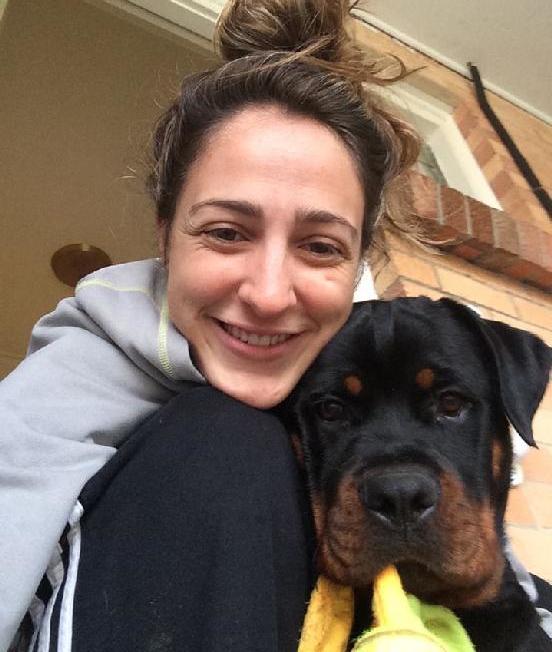
6 minute read
Veronica Boutelle of PPG corporate partner dogbiz presents her strategies for encouraging hesitant clients to give online training a try
p r o f i l e The Dog in Front of You
In our ongoing series of PPG member profiles, this month BARKS features Lynn Webb of The Proficient Pup Dog Training and Massage in Escondido, California
Advertisement
Lynn Webb owns and operates The Proficient Pup Dog Training and Massage in Escondido, California. She spent 16 years working with birds, mammals, and reptiles at the San Diego Zoo Safari Park for before becoming a fulltime dog trainer.
Q: Can you tell us a bit more about yourself, how you first got into animal behavior and training and what you are doing now? A: I learned a lot about animal behavior during my time at the San Diego Zoo Safari Park, during which time I also had the opportunity to educate the general public about the need for conservation. I left the zoo to pursue dog training and I now focus on helping shy and fearful dogs. In addition, I offer canine massage, hence the name of my business. I also specialize in rattlesnake avoidance training without the use of force, pain, or shock – or snakes.

Q: Why did you become a dog trainer or pet care provider? A: I became a dog trainer after my husband and I adopted a 5yearold American Staffordshire terrier from a local shelter. When we discovered that she had some behavior issues, I looked to the internet for some help. I knew enough about animal behavior to know that much of the advice I found was not good, so I decided I would learn
There Is No Excuse There Is No Excuse FOR ABUSE It’s time to ban shock collars
I would say that, as with any helping professional, your first and primary obligation is to do no harm, and we have compelling evidence that applying shock, either systematically or randomly, to domestic dogs increases their general level of stress and discomfort. So given that knowledge, there simply is no ethical rationale for using it. Janis Bradley, Director of Communications and Publications, National Canine Research Council
If there’s a tool which causes pain or discomfort, it has the potential of creating other problems. As animal care professionals, I feel that if we...can’t find kinder, gentler ways of doing something, then maybe we are in the wrong profession. Ken Ramirez, Executive VP and CTO, Karen Pryor Clicker Training “Until these devices are illegal, consumers must
protect themselves and
their dogs by looking beyond the marketing messages of those who profit from their sale and use. It is not
necessary to use electric shock to change behavior. It is not necessary in humans, in zoo species, in marine mammals or in dogs.”
Jean Donaldson,
Author, Train Your Dog Like a Pro
ShockFree.org
© Lynn Webb Lynn Webb with Charlotte, who does not like the camera and, at the time, was concerned that her guardian was wearing shoes – which usually meant she would be leaving the house
properly how to help my dog, and from there, how to be a resource for other fearful dog guardians.
Q: Tell us a little bit about your own pets. A: We have two cats and one dog. Because the cats are seniors and are not as quick and nimble as they used to be, we keep our dog separate from them. This works for everyone.
Q: What is your favorite part of your job? A: Providing understanding for people who may not be getting that from their family or friends. I like to encourage good human behavior and that starts with listening. I like to be the change I wish to see.

Q: What do you consider to be your area of expertise? A: I do not consider myself an expert, but I am most interested in fearful and reactive dogs. I also focus on training humans and dogs to avoid hazards like rattlesnakes.
Q: Are you a crossover trainer or have you always been a force‐free trainer? A: As a professional trainer, I have only been forcefree. When I was a teenager without enough knowledge, I did rely on punishment with our family dogs. For example, shaking a can to stop excessive barking.
Q: What drives you to be a force‐free professional and why is it impor‐tant to you? A: I am driven by the need for education. Without it, people cannot make the best choices. So I want to provide people with education and choices. So many people rely on punishment to change behavior, and it is not necessary. Plus, we are better humans when we do not treat others with punishment.
Q: What are some of your favorite positive reinforcement techniques for the most commonly encountered client‐dog problems? A: My favorite behavior of all is “Find It.” For dogs that may be too fearful to do much training, eating a treat off the floor is much easier. It gives me a starting place for further training and helps me assess a dog's emotional capabilities. I also love hand targeting to assess a dog's ability to focus, and “Go to Mat” to alleviate begging for food, counter surfing, and door dashing, and to promote calm behavior, in general.
Q: What is the reward you get out of a day's training with people and their dogs?: A: I get the most reward from seeing people feel proud about their animals’ successes. I love to see the dog progress, but that only happens if the client is working and when I see that, it’s what makes me happy. Their good work is what gets good results.
Q: What is the funniest or craziest situation you have been in with a pet and their guardian? A: I know I've had many funny moments with my clients, but cannot think of one that stands out. As for crazy, I try to keep that to a minimum!
Q: Who has most influenced your career and how? A: I think the Karen Pryor Academy has most influenced me. I earned my KPA CTP certificate in 2015 and benefitted greatly from attending classes taught by Nan Arthur. She taught me the importance of listening to the dog in front of me. I take that knowledge with me to every classroom and to every client's house.
Q: What advice would you give to a new trainer starting out? A: Listen to your client and do not judge. Take the time to see their perspective. Give them choices. Treat them with the same kindness and understanding as you do their dog. People need positive reinforcement too.
Q: How has PPG helped you to become a more complete trainer? A: PPG provides a great education with webinars and articles. I love to read and learn. n
To be featured in the BARKS Profile section, please complete this form: bit.ly/2y9plS1
Pet Professional Guild has partnered with BarkBox to provide all members with a 20% discount. * Order a monthly box of dog goodies for your canine friend! * Special rates available for gifts for dog friends * A portion of proceeds from each box will go to help dogs in need

The promocode can be found in the Member Area of the PPG website: PetProfessionalGuild.com /benefitinformation
www.barkbox.com












